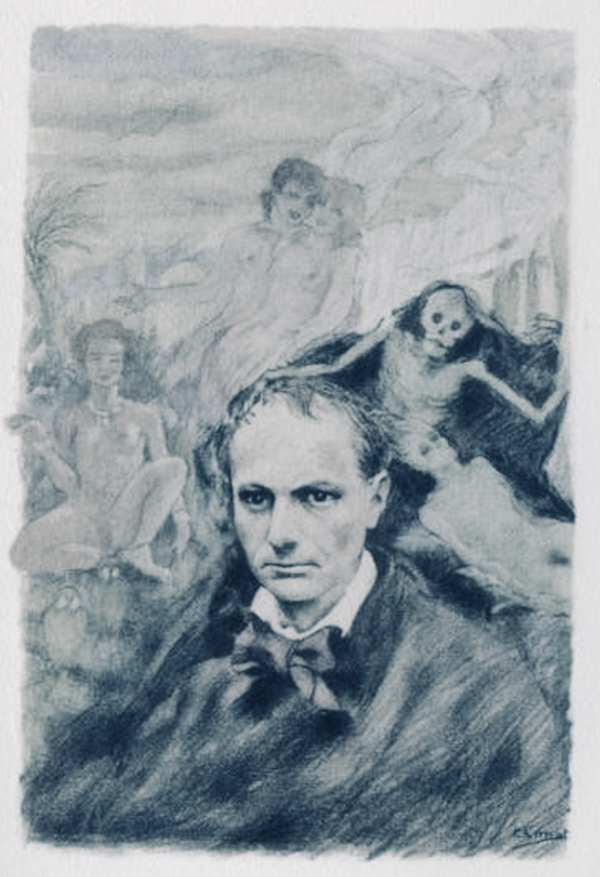
From “Essai de psychologie contemporaine: Charles Baudelaire”
by Paul Bourget
La Nouvelle Revue 13, 1881
If a special nuance in the meaning of love and a new way of interpreting pessimism make Baudelaire’s mind a psychological curiosity of a higher order, what gives him his place in the literature of our time is that he has marvelously understood and almost heroically exaggerated this special character and this quality of newness. He has realized that he arrived late in an aging civilization. And instead of deploring this tardy arrival, like La Bruyere and Musset, he would have been delighted — I almost said honored by it. He was a man for times of decadence, and he turned himself into a theoretician of decadence. This may well be the most disquieting trait of this disquieting figure, and the one most disturbingly seductive to a contemporary soul.
The word decadence frequently refers to the state of a society that produces too many individuals ill-suited to the work of the community. A society must be thought of as an organism. If citizens in a time of decadence are inferior as toilers for the grandeur of the country, are they not also superior as artists delving into the depth of their own souls? If they are ineffectual in private or public endeavors, is it not because they are too skillful in their solitary thinking? If they cannot produce the generations of the future, is it not because the abundance of their refined sensations and exquisite feelings has turned them into sterile yet refined virtuosi of voluptuousness and suffering? If they are incapable of the abnegation of deep faith, is it not because their over-cultivated intelligence has rid them of prejudice and because, having circumnavigated the world of ideas, they have reached this supreme state of equanimity that validates all doctrines while excluding any form of fanaticism?
To be sure a Germanic chieftain of the fourth century A.D. was better able to invade the Roman Empire than a Roman patrician was to defend it; but the erudite, refined, inquisitive, and jaded Roman emperor Hadrian, the art-loving Caesar of Tivoli, represents a much richer treasure of human acquisitions.
The great argument against decadence is that it knows no tomorrow and in the end is always destroyed by barbarity. But is it not the fate of the exquisite and the rare always to be in the wrong in the face of brutality? One is entitled to acknowledge this wrong and to prefer the defeat of decadent Athens to the triumph of violent Macedonia. The same is true of the literatures of decadent periods. They too have no tomorrow. They lead to alterations of vocabulary, subtleties of meaning that make them unintelligible to the generations to come. Fifty years from now the style of the Goncourt brothers — I name men who have deliberately chosen the path of decadence — will be understood only by specialists. The theoreticians of decadence would retort: what does it matter? Is the writer’s purpose to set himself up as a perpetual candidate before the universal suffrage of centuries to come? We delight in our so-called corruptions of style as well as in the refined beings of our race and our time.
It remains to determine whether the exceptional group we constitute is not, in fact, an aristocracy and whether in the realm of aesthetics the plurality of votes does not, in fact, add up to a plurality of dunces. It is as childish to believe in the writer’s immortality — soon the memory of men will be so overloaded by the prodigious quantity of books that any notion of glory will necessarily be bankrupt — as it is deceitful to lack the courage to sustain one’s intellectual pleasure. Let us take pleasure, therefore, in the peculiarities of our ideals and forms, even if they imprison us in a solitude unbroken by visitors. Those who will still come to us will really be our brothers, and why sacrifice to others what is most intimate, most special, and most personal in us?
Both alternatives — producing generations of the future and becoming virtuosi of voluptuousness and suffering — are legitimate, but rarely does an artist have the courage deliberately to choose the second. Baudelaire had it and pushed it to the point of foolhardiness. He proclaimed himself a decadent, and sought — one knows with what deliberate recklessness — all that in literature and art seems morbid and artificial to simpler souls. The sensations he prefers are those elicited by perfumes because they stimulate more than others this I-know-not-what of sensual sadness that we carry within us. His beloved season is the end of autumn, when a melancholic charm seems magically to fill a lowering sky and a heavy heart. His hours of delight are the evening hours, when the sky is as colorful as the background of a picture by da Vinci, with its nuances of a dying pink and a nearly fading green. The beauty of woman appeals to him only when it is precocious and almost macabre in its thinness, with the elegance of a skeleton under adolescent flesh, or else late in life, in the state of decline that comes with ravaged maturity:
. . . And your heart, bruised like a peach,
Is as ripe as your body for sophisticated love.
Caressing and languid music, rare antiques for his furniture, and singular paintings are the necessary accompaniments to his dreary or happy thoughts, “morbid” or “petulant,” as he himself puts it with greater appropriateness. His bedside reading is the work of exceptional authors . . . who, like Edgar Poe, stretched their nervous mechanism to the point of hallucination, rhetoricians of a troubled life whose “language” is “laced with the green of decay.” He feels drawn by an invincible magnetism to the glow of what he has called, with justified outlandishness, “the phosphorescence of decay.”
At the same time, his intense disdain for the vulgar erupts in outrageous paradoxes, laborious mystifications. Those who have known him tell extraordinary anecdotes in regard to this last point. Legend aside, the evidence unquestionably points to this superior man’s evincing something disquieting and enigmatic, even for intimate friends. He treated with similarly painful ironic contempt both the foolishness, naiveté and nonsense of innocent acts and the stupidity of sins. A little of this irony still colors the most beautiful poems of “Flowers of Evil,” and the fear of many readers, even the most subtle among them, of becoming the victims of his overwhelming disdain prevents their fully admiring him.
Being what he is, notwithstanding the subtleties that put his works out of reach of the masses, Baudelaire remains one of the fertile educators of the rising generation. His influence is not as easily recognized as that of a Balzac or a Musset because it makes itself felt on a small group. But in this group are distinguished minds: poets of tomorrow, novelists already dreaming of glory. chroniclers still to come. Indirectly and through them, some of the psychological peculiarities I have tried to bring out in this text reach a broader public; and is not what we call the atmosphere of a period made out of such penetration?
